CUET DU Business Studies Syllabus for, 2023 Exam
Looking for CUET Business Studies syllabus for 2023 entrance exam for B.com and B.com(H) admission to DU and other central universities for Undergraduate course.
Here is the complete detail of the syllabus for your convenience.
CUET BUSINESS STUDIES SYLLABUS FOR B.com, B.com(H)
Note:- There will be one Question Paper that will have 50 questions out of which 40 questions need to be attempted
Principles and Functions of Management
Unit – 1:- Nature and Significance of Management
Management – concept, objectives, importance.
Nature of management; Management as Science, Art, Profession.
Levels of management – top, middle supervisory (First level).
Management functions – planning, organizing, staffing, directing, and controlling.
Coordination – nature, and importance.
Read Here:- CUET Economics Syllabus class 12 for 2022 Entrance Exam
Read Here:- CUET Accountancy Syllabus class 12 for 2022 Entrance Exam
Unit II: Principles of Management
Principles of Management – meaning, nature and significance.
Fayol’s principles of management.
Taylor’s Scientific Management – Principles and Techniques.
Unit III: Business Environment
Business Environment – meaning and importance.
Dimensions of Business Environment – Economic, Social, Technological, Political, and Legal.
Economic Environment in India; Impact of Government policy changes on business and industry, with special reference to the adoption of the policies of liberalization privatization, and globalization.
Unit IV: Planning
Meaning, features, importance, limitations.
Planning process.
Types of Plans – Objectives, Strategy, Policy, Procedure, Method, Rule, Budget, Programme
Unit V: Organising
Meaning and importance.
Steps in the process of organizing.
Structure of organization – functional, and divisional.
Formal and informal organization.
Delegation: meaning elements and importance.
Decentralization: meaning and importance.
Difference between delegation and decentralization.
Unit VI: Staffing
Meaning, need, and importance of staffing.
Staffing as a part of Human Resources Management.
Steps in the staffing process.
Recruitment – meaning and sources.
Selection – meaning and process.
Training and Development – meaning, need, methods – on the job and off the job methods of training.
Unit VII: Directing
Meaning, importance, and principles.
Elements of Direction:
– Supervision – meaning and importance
– Motivation – meaning and importance, Maslow’s hierarchy of needs; Financial
and non-financial incentives.
– Leadership – meaning, importance; qualities of a good leader.
– Communication – meaning and importance, formal and informal communication; barriers to effective communication
Unit VIII: Controlling
Meaning and importance.
Relationship between planning and controlling.
Steps in the process of control.
Techniques of controlling.
Business Finance and Marketing
Unit IX: Business Finance
Business finance – meaning, role, objectives of financial management.
Financial planning – meaning and importance.
Capital Structure – meaning and factors.
Fixed and Working Capital – meaning and factors affecting their requirements.
Unit X: Financial Markets
Concept of Financial Market: Money Market – nature instruments;
Capital market: nature and types – primary and secondary market.
The distinction between capital market and money market.
Stock Exchange – meaning, functions, NSEI, OCTEI, Trading Procedure.
Securities and Exchange Board of India (SEBI) – Objectives, Functions.
Unit XI: Marketing
Marketing – meaning, functions, role.
The distinction between marketing and selling.
Marketing mix – concept and elements:
– Product – nature, classification, branding, labeling, and packaging
– Physical distribution: meaning, role; Channels of distribution, – meaning, types, factors, determining the choice of channels.
– Promotion – meaning and role, promotion mix, Role of Advertising and personal selling; objections to Advertising.
– Price: factors influencing pricing.
Unit XII: Consumer Protection
Importance of consumer protection.
Consumer rights.
Consumer responsibilities.
Ways and means of consumer protection – Consumer awareness and legal redressal with special reference to the Consumer Protection Act.
Role of consumer organizations and NGOs.
Unit XIII: Entrepreneurship Development
Concept, Functions, and Need.
Entrepreneurship Characteristics and Competencies.
Process of Entrepreneurship Development.
Entrepreneurial Values, Attitudes, and Motivation – Meaning and Concept.


